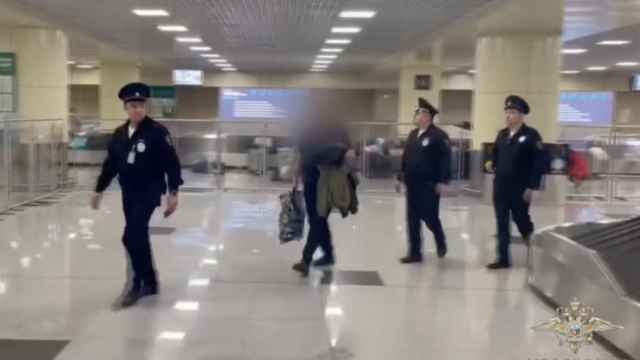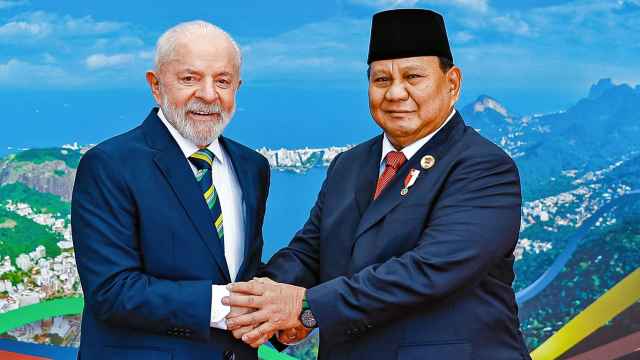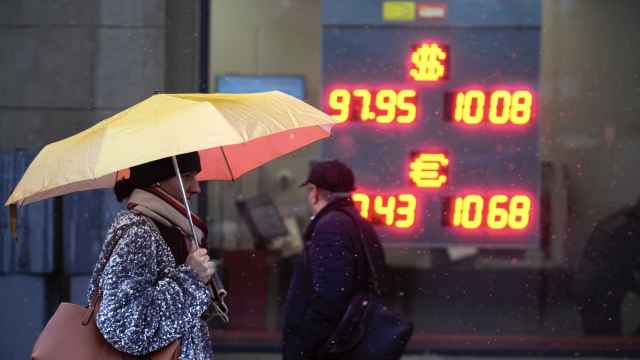Prime Minister Vladimir Putin is coming back as president in the March 2012 elections, or at least that's what everyone is saying following two important speeches in the last two months. But I don't get it. While it is clear that he is trying to rescue his obviously bankrupt United Russia party before polls open in December, I don't think this necessarily means that he will come back as president. That is one of the options open to him, but it is not a given or even likely. Rather, everything will depend on the results of the Duma elections.
The first of Putin's two speeches was his annual report to the Duma on April 20. He used this occasion to showcase the many "real" achievements that the government has overseen in the last decade and presented his vision for a strong, resistant country that is not beholden to any "unjustified liberalism." A stab at President Dmitry Medvedev? More on this in a minute.
The second speech was at a regional United Russia party conference on May 6 (Putin heads that party, but is not a member), where he presented the All-Russia People's Front election platform, an alliance of trade unions, women's groups, social organizations and other semi-political organizations that have all shown themselves to be pro-Kremlin in the past. It was this idea that really convinced the pundirazzi that Putin has presidential ambitions.
The first thing to understand is, despite all the criticism, Russia is halfway toward democracy: Party politics really matter, even if they are not as important as in the West, where they are the only thing that matters.
Put it this way: Even the Kremlin knows it can't claim to win 90 percent of the vote as recently rulers recently claimed in Kazakhstan and Belarus. The people wouldn't stand for it. If the Kremlin organized this sort of result — which it is completely capable of doing — you would quickly have at the least mass demonstrations, doubly as dissatisfaction with the government is palpable these days. Moreover, the Kremlin has made it abundantly clear on several occasions that it dares not stoke the popular dissent fire — remember how fast it back-pedaled when it tried to make pensioners pay for their bus passes a few years ago?
Instead, in Russia's "managed democracy," citizens don't have a free choice, but they have some choice and the Kremlin needs to convince a large number of them to vote for the government. (It has struck "against all" off the ballot because the option nearly won in some regions in the last general election.) And after a decade of economic recovery and rising living standards, a significant number of people are actually willing to vote for the powers that be. All said and done, both Putin and Medvedev are genuinely popular.
The rub is exactly how many people you can fool all of the time, to paraphrase Abraham Lincoln, and that is what is behind Putin's speeches: the number of people willing to be fooled is falling fast.
Follow the Money
In business you can judge the success of corporate strategy by looking at the numbers; success is finely judged in terms of dollars and cents, and as market forces mean that costs and demand are relatively stable and quantifiable, you can usually make extremely accurate forecasts of how a strategy will do.
Politics is a different matter. As the fundamental unit is not a dollar, but the whim of the voter on election day, the business of forecasting elections is a lot harder to do. Voters' decision is one part rational (hiking pensions will win votes and so is predictable) and one part sentiment (climbing about in Siberia with your T-shirt off may win votes, but not necessarily). Politicians have to play on both these forces to get the job of their dreams.
And so do the political commentators: a good op-ed will cover the rational aspects, but mix them up with the irrational elements and sprinkle in a good dose of old fashion rhetoric, wandering off into ideology, paint character portraits and indulge in some muckraking. Politicians understand this and the great ones are masters of manipulating journalists' appetites to create an image they think the public will buy. That's why opinion polls and focus groups are so important in modern politics.
With its super majority in the State Duma, the Kremlin has full control of the rational part of politics. (Pensions were hiked by 50 percent at the start of this year, and teachers were the latest group to enjoy voting winnings pay raises.) Moreover, with oil at more than $100 to the barrel, the government has plenty of money to buy lots of popularity. The difficulty is that it has lost the sentimental part of the vote so completely that it can't even ensure a simple majority in December.
As a party, United Russia is bankrupt. Widely known as "the party of crooks and thieves," a phrase coined by anti-corruption activist Alexei Navalny, it no longer has any legitimacy with the voting masses. Indeed, according to sone sources in Nizhny Novgorod, United Russia actually came third, not first, as announced, in regional elections this March; Communists actually won the election. And this was after the ruling powers used every dirty trick in the book to push their cause. If regional elections in March were a curtain raiser for December's poll, United Russia won't even make a simple majority. In other words, the Kremlin is facing a political crisis of the first order.
The introduction of the People's Front is Putin's rescue plan. The timing looks about right too: six months is enough time to build up a campaign based on hype into a crescendo, but not so long that you have to build anything of substance.
Depending on the Duma
How important is it to the government to win a constitutional majority — more than 60 percent — which would allow the prime minister to change the constitution at whim? Based on the last Duma elections in 2007, it is of paramount importance.
United Russia easily won a large majority last time around (by making full use of the gamut of administrative resources, of course). However, it fell short of the constitutional majority by a few percentage points, and statisticians convincingly showed that some 14 million votes were stuffed into ballot boxes to take the party over the magic threshold. The OECD said the elections were not up to international standards. Still, the fix was relatively small and so the elections passed off without incident.
That won't be the case this time around. United Russia is a political zombie, and the fix will have to be on a massive scale if the party is to win a constitutional majority again on its own. (The regional elections in March were clearly a travesty.) And if the Kremlin attempts to pretend that United Russia does win a landslide, it will be taking a very big risk.
The People's Front is an aggressive move to fix this political problem. Everything will depend on the plan's success, and there are several possible outcomes at voting time:
1. Kremlin's party proxies win a clear constitutional majority, and ZAO Kremlin continues business as usual.
2. Kremlin's party proxies almost win a clear constitutional majority, and there is some fixing but it is small enough that no one gets too upset.
3. Kremlin's party proxies win a simple majority, and there is massive vote rigging to give them a constitutional majority. This may or may not end up in popular protests, but it will certainly bring down more international condemnation and also raise political tensions.
4. Kremlin's party proxies win a simple majority, and the Kremlin accepts it. In this case, Russia takes a giant step toward real democracy and Medvedev's vision of a modern Russia.
What will Putin do in each of these cases? In the first scenario, there is no reason why Putin should not stay on as prime minister. He has control of the real power in Russia as well as the day to day running of government. And same is true in the second case for the same reasons.
His choice is more difficult in the third case because while he would still control the reigns of power, he would head an essentially illegitimate government. If the people rebel against the election, then Putin will held personally responsible. This would destroy his personal popularity, which is the cornerstone of his hold and power, and hence he would become vulnerable to attacks by oligarchs and Kremlin factions. The temptation to leave his position as prime minister and take back his old job will be high.
The dream scenario would be the one in which the Kremlin accepts a simple majority and Putin says on as prime minister, relying on his popular mandate to keep him in his job rather than on the constitution, which gives him the authority to strip the president of his powers if Medvedev tried to sack him. Then the rest of the world should shout "Hosanna!" as Russia would have taken a giant step toward true democracy.
But the dream scenario is unlikely. The Kremlin has made it clear that it will allow more political pluralism (that was the whole point of hiring Medvedev as president rather than Sergei Ivanov in 2008), but only when Russia becomes more prosperous. The Kremlin has also made it abundantly clear that it wants to make this transition slowly.
Both Medvedev and Putin have explicitly said they are afraid of repeating the mistake of perestroika, when Gorbachev allowed political reform before economic reform, and as his mild economic reforms failed, the whole loosening process spun out of control. Putin's plan is to do the economic reforms first, then start on the political changes when Russia is prosperous.
And what of Medvedev? The press is leaping on any contradictory comment the president makes as evidence of a split between the two men and speculating that Medvedev might mount a real challenge to Putin in the 2012 presidential race.
Commenting on Russian politics over most of the last two decades has all been about understanding the personalities. However, while the 1990s was all about raw power, the naughties has been about policy; a lot more people are involved in running Russia these days, and the debate they are having matters. As party politics develop, pundits are having a difficult time kicking old habits and seeing Russian politics as anything but a scrap between "bulldogs under the carpet."
It is not impossible that Medvedev has developed a taste for power, but it seems more likely that Medvedev has been carefully chosen to bolster the Kremlin's appeal to the electorate. Russia society is rapidly becoming divided between state employees and the elderly, who yearn for the certainties of the past, forward-thinking young people, entrepreneurs and the emerging middle class — 100 million people by some counts. Putin cannot appeal to both groups at once, but setting Medvedev up as the modernist reformer allows him to appeal to the broadest sections of society while keeping actual power in the Kremlin's control.
It is possible that Medvedev could be ousted. Over the last four years, a liberal camp of businessmen and government officials that want to go faster has grown up around the him. With per capita GDP at $15,900 at the end of 2010 according to the CIA Factbook, Russia is prosperous, and the Kremlin could start easing its control now. But it appears that Putin is not ready yet, and this may turn out to be his greatest political misjudgment.
In order to defang this alternative power center, there are also persistent rumors in Moscow that Putin will stay one as prime minister but put someone else in as president — the new Moscow Mayor Sergei Sobyanin has been mentioned as a candidate. But is this group a real threat? The liberal businessmen have by definition made their fortunes by not playing the government game. Given that Putin has successfully contained massive state interests like Rosneft and Gazprom, surely a collective of supermarket owners is not going to pose a threat? Moreover, their main ability to make mischief would be to persuade Medvedev to sack Putin, but it is widely assumed that Medvedev himself remains a member of Putin's group, not his own.
Nevertheless, Russia's elite is clearly extremely nervous and the capital flight of the 1990s has returned in the last six months. There was $9 billion of real inbound FDI in the first quarter of this year, but $19 billion of outbound FDI — double the amount a year earlier — which strongly suggests that Russia's top dogs are putting something aside just in case. Bottom line: Like in the last election cycle, the Duma elections and not the presidential elections will be the crucial event, and everything hangs on how successful Putin is at persuading enough Russians to vote for this People's Front/United Russia coalition to give it a fig leaf of legitimacy.
A Message from The Moscow Times:
Dear readers,
We are facing unprecedented challenges. Russia's Prosecutor General's Office has designated The Moscow Times as an "undesirable" organization, criminalizing our work and putting our staff at risk of prosecution. This follows our earlier unjust labeling as a "foreign agent."
These actions are direct attempts to silence independent journalism in Russia. The authorities claim our work "discredits the decisions of the Russian leadership." We see things differently: we strive to provide accurate, unbiased reporting on Russia.
We, the journalists of The Moscow Times, refuse to be silenced. But to continue our work, we need your help.
Your support, no matter how small, makes a world of difference. If you can, please support us monthly starting from just $2. It's quick to set up, and every contribution makes a significant impact.
By supporting The Moscow Times, you're defending open, independent journalism in the face of repression. Thank you for standing with us.
Remind me later.





